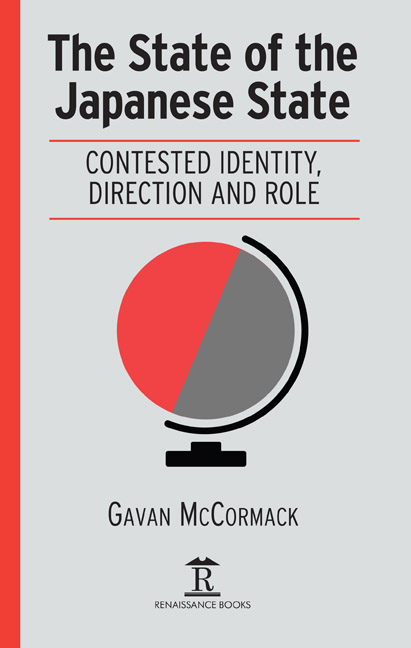Book contents
- Frontmatter
- Contents
- Preface
- Chapter 1 The Improbable Package
- Chapter 2 The Client State
- Chapter 3 The Client State’s Client State
- Chapter 4 Okinawa – State Violence and Civic Resistance
- Chapter 5 Around the East [China] Sea
- Chapter 6 The Construction State
- Chapter 7 The Constitutional State
- Chapter 8 The Rampant State
- Chapter 9 Conclusion
- Afterword
- Index
Chapter 8 - The Rampant State
Published online by Cambridge University Press: 04 May 2022
- Frontmatter
- Contents
- Preface
- Chapter 1 The Improbable Package
- Chapter 2 The Client State
- Chapter 3 The Client State’s Client State
- Chapter 4 Okinawa – State Violence and Civic Resistance
- Chapter 5 Around the East [China] Sea
- Chapter 6 The Construction State
- Chapter 7 The Constitutional State
- Chapter 8 The Rampant State
- Chapter 9 Conclusion
- Afterword
- Index
Summary
IKKYO– “ONE STRONG”
FOR FIVE YEARS, and indeed even for the ten years before that, Abe Shinzo has exercised an extraordinary degree of influence over the Japanese state. Already the third longest serving Prime Minister of modern times, the prospect opens of his remaiing office through to late 2021, guiding Japan through the transition of imperial regimes in 2019 and the Olympic Games of 2020. That is not to say that he enjoys strong popular support but his dominance over the state was such that the term “ikkyo” (one strong, implying dictatorship) began to be applied to his government. The electoral reforms of the 1990s had served to entrench the LDP to the point where the support of around 16 to 18 percent of the electorate in the small seat constituencies (as in December 2014) earned it a landslide parliamentary Majority, whereas the “left” (communist and socialist) vote that had held to about thirty per cent throughout the Cold War collapsed after it to around three per cent. It was at least theoretically possible that Abe might manage in September 2018 to extend his party leadership position to three terms (nine years) and so steer the country through the 2020 Olympic Games and beyond to the adoption of new constitution in 2020, before retiring in glory some time before September 2021.
MORITOMO GAKUEN
Moritomo Gakuen, an Osaka educational organization headed by branch members of Nihon Kaigi, was to have expanded on its existing kindergarten (Tsukamoto Kindergarten) by setting up an elementary school in April 2017 under the name “Abe Shinzo Commemorative Elementary School.” Abe's wife Akie was designated its honorary principal and the 1890 Imperial Rescript on Education adopted as statement of the school's educational philosophy. The school's head was able to negotiate a purchase price for the Finance Ministry-owned land at a sum estimated to have been about 14 per cent of its market value, by some accounts following the gift of one million yen (about $8,800) in the name of the Prime Minister, handed over by his wife.
Treated as a sacred document and memorized by school children, the Imperial Rescript had been central to the modern Japanese state's emperor worship.
- Type
- Chapter
- Information
- The State of the Japanese StateContested Identity, Direction and Role, pp. 209 - 230Publisher: Amsterdam University PressPrint publication year: 2018

